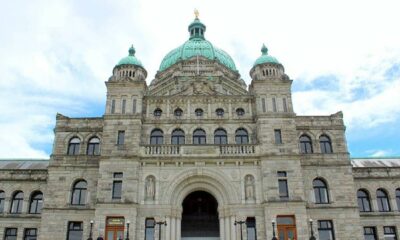Politics
B.C. Court Ruling on Indigenous Land Title Sparks Controversy

A recent decision by the B.C. Supreme Court affirming the Aboriginal title of the Cowichan Nation over a portion of Richmond, including private land, has provoked significant debate among residents of British Columbia. The ruling, which grants Indigenous peoples constitutional ownership and jurisdictional rights over unceded territories, has raised concerns about its implications for property rights and Indigenous-provincial relations.
On August 7, 2025, the court ruled in favor of the Cowichan Tribes, granting them title to approximately 800 acres in southeast Richmond, known as Tl’uqtinus, along with associated fishing rights. Justice Barbara Young stated that this decision allows Indigenous communities to make autonomous decisions regarding land use. In response, the B.C. government announced an appeal in September, citing worries about the potential disruption to private property rights.
A recent poll conducted by the Angus Institute reveals that a considerable majority of British Columbians—61%—support the government’s appeal against the ruling. Only 12% oppose it, while 27% remain uncertain. Among those surveyed, 66% of property owners and 48% of non-property owners expressed concern that the ruling could harm relations between Indigenous communities and the provincial government. Notably, over half of past B.C. NDP voters and nearly 80% of past B.C. Conservative Party voters share this apprehension.
During a recent meeting, Richmond residents confronted Mayor Malcolm Brodie, expressing frustration over the lack of communication regarding the case, which has been ongoing since March 2014. They questioned why they were only now being informed of the ruling, which could significantly impact their property rights. In 2017, Justice Jennifer Power had denied a request for formal notice to landowners but noted that informal notifications could still occur.
The implications of this ruling are seen as serious by a majority of the population, with 67% of B.C. residents fearing for their property rights, particularly among 88% of Conservative voters and 74% of property owners. Despite the Cowichan Nation’s assurance that they do not seek to invalidate private land titles, the ruling has created uncertainty regarding the coexistence of Aboriginal and fee simple titles.
British Columbia’s Attorney General Niki Sharma cautioned that the ruling could lead to “significant unintended consequences for fee simple private property rights.” Residents have been informed that challenging Aboriginal title against fee simple ownership may be futile, as the province’s land title system is designed to provide legal certainty for landowners.
The government appeal follows a precedent set by the B.C. government recognizing the Haida title over Haida Gwaii through a land transfer with the Council of the Haida Nation, which included protections for private property. As the controversy unfolds, stakeholders, including the City of Richmond and various Indigenous groups, continue to navigate the complexities introduced by this landmark ruling.
As discussions on reconciliation and land rights evolve, the path ahead remains uncertain for both Indigenous communities and property owners alike.
-

 World4 months ago
World4 months agoScientists Unearth Ancient Antarctic Ice to Unlock Climate Secrets
-

 Entertainment4 months ago
Entertainment4 months agoTrump and McCormick to Announce $70 Billion Energy Investments
-

 Lifestyle4 months ago
Lifestyle4 months agoTransLink Launches Food Truck Program to Boost Revenue in Vancouver
-

 Science4 months ago
Science4 months agoFour Astronauts Return to Earth After International Space Station Mission
-

 Technology2 months ago
Technology2 months agoApple Notes Enhances Functionality with Markdown Support in macOS 26
-

 Top Stories3 weeks ago
Top Stories3 weeks agoUrgent Update: Fatal Crash on Highway 99 Claims Life of Pitt Meadows Man
-

 Sports4 months ago
Sports4 months agoSearch Underway for Missing Hunter Amid Hokkaido Bear Emergency
-

 Politics3 months ago
Politics3 months agoUkrainian Tennis Star Elina Svitolina Faces Death Threats Online
-

 Technology4 months ago
Technology4 months agoFrosthaven Launches Early Access on July 31, 2025
-

 Politics4 months ago
Politics4 months agoCarney Engages First Nations Leaders at Development Law Summit
-

 Entertainment4 months ago
Entertainment4 months agoCalgary Theatre Troupe Revives Magic at Winnipeg Fringe Festival
-

 Top Stories1 week ago
Top Stories1 week agoFamily Remembers Beverley Rowbotham 25 Years After Murder





















